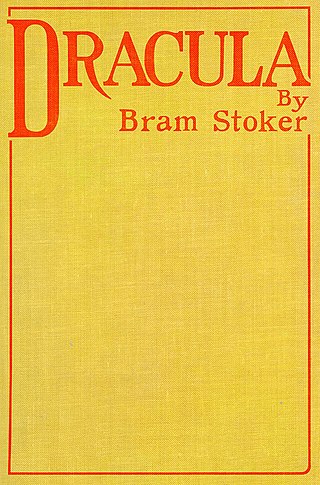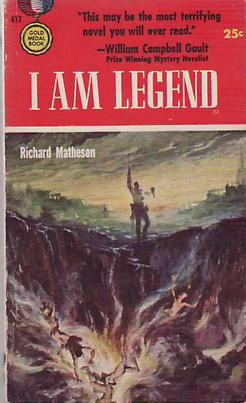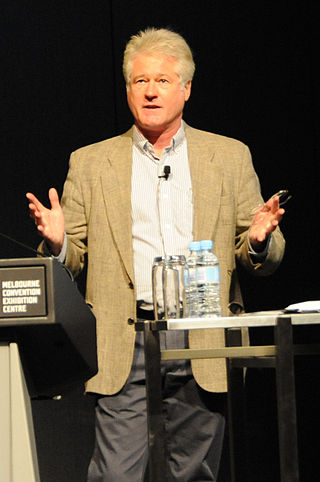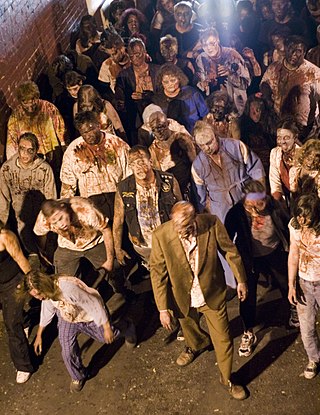
Dracula is a novel by Bram Stoker, published in 1897. An epistolary novel, the narrative is related through letters, diary entries, and newspaper articles. It has no single protagonist, but opens with solicitor Jonathan Harker taking a business trip to stay at the castle of a Transylvanian nobleman, Count Dracula. Harker escapes the castle after discovering that Dracula is a vampire, and the Count moves to England and plagues the seaside town of Whitby. A small group, led by Abraham Van Helsing, hunt Dracula and, in the end, kill him.

Horror is a genre of fiction that is intended to disturb, frighten or scare. Horror is often divided into the sub-genres of psychological horror and supernatural horror, which are in the realm of speculative fiction. Literary historian J. A. Cuddon, in 1984, defined the horror story as "a piece of fiction in prose of variable length... which shocks, or even frightens the reader, or perhaps induces a feeling of repulsion or loathing". Horror intends to create an eerie and frightening atmosphere for the reader. Often the central menace of a work of horror fiction can be interpreted as a metaphor for larger fears of a society.

I Am Legend is a 1954 post-apocalyptic horror novel by American writer Richard Matheson that was influential in the modern development of zombie and vampire literature and in popularizing the concept of a worldwide apocalypse due to disease. The novel was a success and was adapted into the films The Last Man on Earth (1964), The Omega Man (1971), and I Am Legend (2007). It was also an inspiration for George A. Romero's Night of the Living Dead (1968).
Earle Gene Labor was an American writer. A George Wilson Professor (Emeritus) of American Literature at Centenary College of Louisiana, his research and teaching career was devoted to the study of the American author, Jack London. He taught the first undergraduate course devoted to London at Utah State University in 1966. Labor taught the first-ever graduate course on London in 1973-74 while on a Fulbright Scholarship.
Delbert Duane Thiessen is an American psychology professor emeritus whose research focused on evolutionary mechanisms of reproduction and social communication. Del Wolf Thiessen, Ph.D., Born: August 13, 1932 Died:February 9, 2022 Professor Emeritus Psychology at University of Texas at Austin, Texas.

Wheeler Winston Dixon is an American filmmaker and scholar. He is an expert on film history, theory and criticism. His scholarship has particular emphasis on François Truffaut, Jean-Luc Godard, American experimental cinema and horror films. He has written extensively on numerous aspects of film, including his books A Short History of Film and A History of Horror. From 1999 through the end of 2014, he was co-editor, along with Gwendolyn Audrey Foster, of the Quarterly Review of Film and Video. He is regarded as a top reviewer of films. In addition, he is notable as an experimental American filmmaker with films made over several decades, and the Museum of Modern Art exhibited his works in 2003. He taught at Rutgers University, The New School in New York, the University of Amsterdam in the Netherlands, and as of May 2020, is the James E. Ryan professor emeritus of film studies at the University of Nebraska in Lincoln.

Russell Blackford is an Australian writer, philosopher, and literary critic.

Emily Dickinson Blake "Blakey" Vermeule is an American scholar of eighteenth-century British literature and theory of mind. She is a Professor of English at Stanford University.
Darwinian literary studies is a branch of literary criticism that studies literature in the context of evolution by means of natural selection, including gene-culture coevolution. It represents an emerging trend of neo-Darwinian thought in intellectual disciplines beyond those traditionally considered as evolutionary biology: evolutionary psychology, evolutionary anthropology, behavioral ecology, evolutionary developmental psychology, cognitive psychology, affective neuroscience, behavioural genetics, evolutionary epistemology, and other such disciplines.

Paul Bloom is a Canadian American psychologist. He is the Brooks and Suzanne Ragen Professor Emeritus of psychology and cognitive science at Yale University and Professor of Psychology at the University of Toronto. His research explores how children and adults understand the physical and social world, with special focus on language, morality, religion, fiction, and art.

Lennard J. Davis, a nationally and internationally known American specialist in disability studies, is Distinguished Professor of English at the University of Illinois at Chicago, School of Arts and Sciences, and also Professor of Disability and Human Development in the School of Applied Health Sciences and Professor of Medical Education in the University of Illinois College of Medicine.
David Fredrick Bjorklund is an American professor of psychology at Florida Atlantic University. His areas of research interest include cognitive development and evolutionary developmental psychology. His works include authoring several books and over 130 scientific papers. He is editor of the peer-reviewed Journal of Experimental Child Psychology.

Zombie apocalypse is a genre of fiction in which society collapses due to overwhelming swarms of zombies. Typically only a few individuals or small bands of survivors are left living. In some versions, the reason the dead rise and attack humans is unknown, in others, a parasite or infection is the cause, framing events much like a plague. Some stories have every corpse rise, regardless of the cause of death, whereas others require exposure to the infection.
Biocultural anthropology can be defined in numerous ways. It is the scientific exploration of the relationships between human biology and culture. "Instead of looking for the underlying biological roots of human behavior, biocultural anthropology attempts to understand how culture affects our biological capacities and limitations."
Supernatural horror film is a film genre that combines aspects of horror film and supernatural film. Supernatural occurrences in such films often include ghosts and demons, and many supernatural horror films have elements of religion. Common themes in the genre are the afterlife, the Devil, and demonic possession. Not all supernatural horror films focus on religion, and they can have "more vivid and gruesome violence".
Joseph Carroll is a scholar in the field of literature and evolution. He received his PhD in Comparative Literature from the University of California, Berkeley and is now Curators’ Distinguished Professor Emeritus at the University of Missouri–St. Louis.
The history of evolutionary psychology began with Charles Darwin, who said that humans have social instincts that evolved by natural selection. Darwin's work inspired later psychologists such as William James and Sigmund Freud but for most of the 20th century psychologists focused more on behaviorism and proximate explanations for human behavior. E. O. Wilson's landmark 1975 book, Sociobiology, synthesized recent theoretical advances in evolutionary theory to explain social behavior in animals, including humans. Jerome Barkow, Leda Cosmides and John Tooby popularized the term "evolutionary psychology" in their 1992 book The Adapted Mind: Evolutionary Psychology and The Generation of Culture. Like sociobiology before it, evolutionary psychology has been embroiled in controversy, but evolutionary psychologists see their field as gaining increased acceptance overall.
Wesley J. Wildman is a contemporary Australian-American philosopher, theologian, and ethicist. Currently, he is a full professor at the Boston University School of Theology, founding member of the faculty of Computing and Data Sciences, and convener of the Religion and Science doctoral program in Boston University's Graduate School. He is executive director of The Center for Mind and Culture, founding co-director of the Institute for the Biocultural Study of Religion, and founding co-editor of the journal Religion, Brain & Behavior. Wildman's academic work has focused on interpreting religion and building theories of religious beliefs, behaviours, and experiences that acknowledge value in longstanding traditions while attempting to remain intellectually viable in light of the biological, cognitive, evolutionary, physical, and social sciences. He is an important figure in the religion and science field, along with scholars such as Robert John Russell, Nancey Murphy, and John Polkinghorne.
John Edgar Browning is an American author, editor, and scholar known for his nonfiction works about the horror genre and vampires in film, literature, and culture. Previously a visiting lecturer at the Georgia Institute of Technology, he is now a professor of liberal arts at the Savannah College of Art and Design in Atlanta, Georgia.

Chelsea Shields is an American bio-social anthropologist, placebo studies expert, human evolution expert, strategic consultant, women's rights activist, and TED Fellow. Shields and her work have appeared on broadcasts and publications including TED, Infants on Thrones, and TechInsider.










